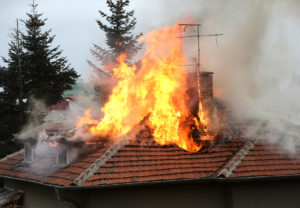
House fires are the most common disaster in the United States. Every year, there are more than 88,000 home fires across the country that are responsible for about 2,500 fire deaths and 11,500 injuries. Most house fires occur during the late fall and winter, especially December and January, when space heaters, furnaces, and fireplaces introduce greater fire risks in the home. Still, many home fires do occur during the summer, especially due to fireworks and outdoor grilling.
At MyHandyman, we recommend taking the following steps to safeguard your home during the summertime.
#1. Don’t use fireworks at home
Every year, fireworks start about 18,500 fires, including 1,300 home fires and 300 vehicle fires. In 2017, fireworks fire incidents caused $94,000 in property loss in Ohio alone with about half of all fires occurring on July 4th. The best way to protect your home or family is avoiding fireworks at home. According to the U.S. Fire Administration, it’s always best to leave fireworks to the professionals and attend public fireworks displays instead.
#2. Be careful when grilling outdoors
Cooking is the leading cause of house fires and the dangers only grow when you move the cooking outdoors. Practice safe grilling this summer with these grilling fire tips:
• Always use your grill outdoors and far away from any structures. Make sure there are no overhanging branches. The National Fire Protection Association reports that 27% of home fires started by an outdoor grill started in a patio or courtyard and 29% started on an open porch or exterior balcony.
• Clean your grill after every use to prevent a buildup of fat or grease that can cause a grease fire.
• Stabilize the grill on a flat surface to prevent it from tipping.
• Watch for gas leaks. If you have a propane grill, check the hose for leaks by applying soapy water, turning on the gas, and looking for bubbles. You may also smell gas near your grill.
• Use charcoal starter fluid carefully. Don’t add starter fluid to the fire if it starts to go down.
• Have baking soda, a bucket of sand, or a fire extinguisher handy if you need to put out the fire. Never add water to a grease fire.
#3. Beware of lawn mower fires
Lawn mowers are a surprisingly common source of home fires in the warm months. The ethanol in gas has a corrosive effect on rubber, metal, and steel in fuel tanks, fuel lines, and carburetors while drawing moisture out of the air in your gas tank. Over time, damage allows fuel to find its way into the engine cylinder and crankcase where it mixes with engine oil and flows out of the air intake and muffler.
You may use your mower with no signs of trouble then put it away in your garage without realizing the potential danger. If the fuel flowers from the tank into the engine while the engine is turned off, it will eventually cause a buildup of flammable vapors and a heat source can spark a fire in your garage. To reduce this risk, replace your fuel line every other year, inspect your carburetor for damage, and add fuel stabilizer every fill up.
#4. Practice fire safety while smoking
Smoking is the leading cause of fatal fires and smoking-related fires happen throughout the year. Despite accounting for just 5% of home fires, smoking is responsible for more than 20% of home fire deaths. If you smoke, do it outdoors if possible. Be sure cigarettes are completely extinguished every time by dipping them in water or a bucket with sand — never directly in the trash after putting them out. Don’t smoke in bed because bedding and mattresses can catch on fire easily, especially if you fall asleep. Smoking does not mix with medical oxygen which is highly flammable and may explode near a flame or spark.
#5. Have your air conditioner inspected
Regular maintenance and tune-ups of your heating and cooling systems can help prevent a fire. In the winter, space heaters and furnaces are leading causes of house fires but air conditioners are often to blame in the warm months. In many cases, air conditioner fires are the result of improper maintenance which leads to dirty coils, clogged filters, and worn wiring. As dust builds up in your system, it essentially stores a flammable material inside your air conditioner that may catch fire. Electrical malfunctions like short circuits can cause an electrical fire. If your air conditioner is leaking, condensation can drip onto electrical equipment and cause sparks or short circuits that ignite insulation, wood, and nearby material.
Fixed local and portable air conditioners are more likely to cause fires than central AC systems because they tend to have insufficient wiring for the heavy electrical load. Most air conditioner fires happen in the bedroom where window and wall units are usually installed. These fires usually happen between 2 pm and 8 pm when the air conditioner is most likely to be in use.
#6. Reduce your risk of a kitchen fire
Throughout the year, kitchen fires are responsible for most home fires. The stovetop is the usual starting point for kitchen fires, not the oven. To reduce your risk of a fire, always remain in the kitchen when grilling, frying, or cooking on your stovetop. Make sure there are no flammable materials near the heat such as a paper towel dispenser or dish towel. Keep a fire extinguisher in the kitchen but not too close to the stove and oven in case of fire and remember to suffocate cooking flames with a lid, not water.
#7. Check your dryer
Dryers are responsible for thousands of house fires every year and account for 90% of appliance fires. Most dryer fires are the result of failing to clean the dryer vent ductwork as highly flammable lint will build up over time and may be ignited by the heat of the dryer. Clean your lint trap between every load and clean your dryer vent at least once a year with a special vent cleaning brush. Make sure the outside dryer exhaust vent allows hot air to escape.
#8. Make sure your smoke detectors work
You should have at least one smoke detector on every floor of your house in an area where it can be heard from every room of the house. Inspect your smoke detectors regularly to make sure they work and develop an escape plan that your entire household can practice in case of emergency. The escape route should have two possible exits from every room and these paths should be as free of clutter as possible.
Need help making your home safer from fires this summer? Contact MyHandyman in Columbus, Ohio today to learn how we can help.
